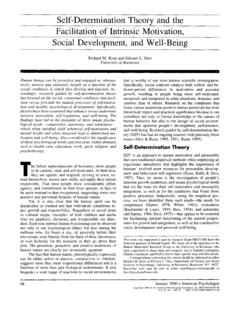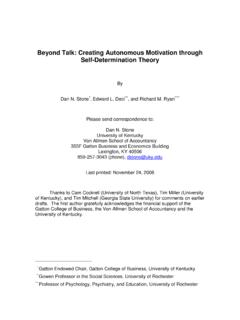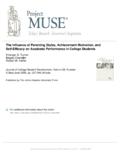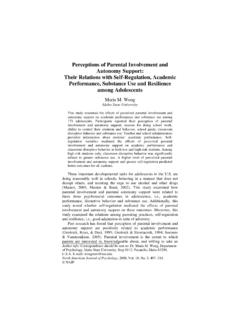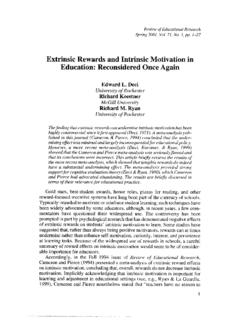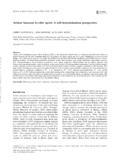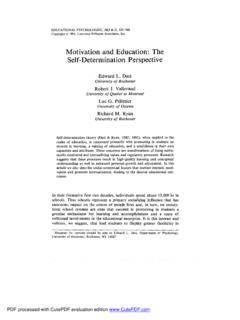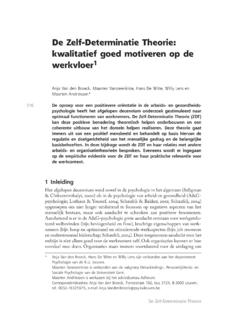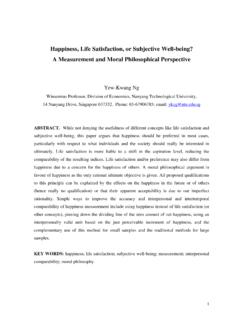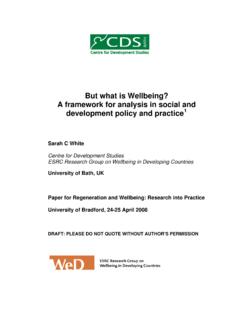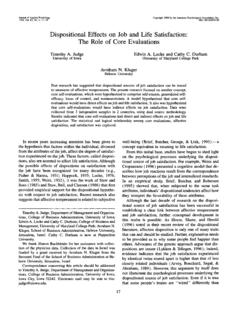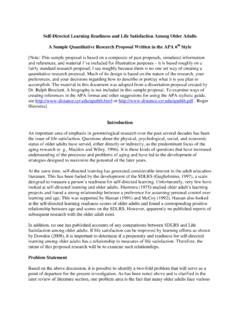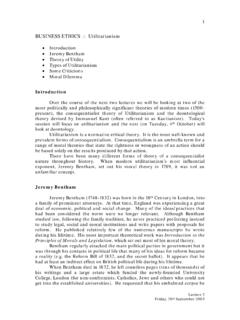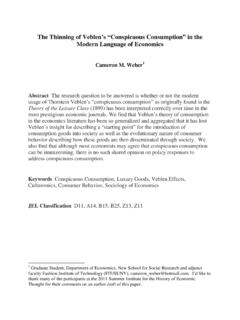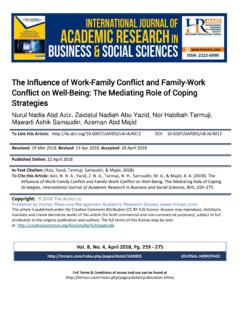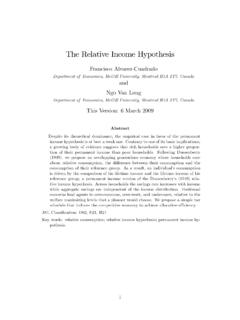Transcription of The Benefits of Benevolence: Basic Psychological Needs ...
1 Journal of Personality 00:00, Month 2015VC2015 Wiley Periodicals, : Benefits of Benevolence: BasicPsychological Needs , Beneficence,and the Enhancement of well -BeingFrank Martela1and Richard M. Ryan2,31 University of Helsinki, Finland2 Institute for Positive Psychology and Education, Australian Catholic University3 University of Rochester, NYAbstractPro-social behaviors have been associated with enhanced well -being, but what Psychological mechanisms explain this connec-tion? Some theories suggest that beneficence the sense of being able to give inherently improves well -being, whereas evi-dence from self-determination theory (Weinstein & Ryan, 2010) shows that increases in well -being are mediated bysatisfaction of innate Psychological Needs for autonomy, competence, and relatedness.
2 Here we simultaneously assess thesetwo explanations. Study 1 (N5335) used a cross-sectional survey with an Internet sample to develop a measure to assessbeneficence satisfaction. The next two cross-sectional Internet-sample studies tested mediators between pro-social behaviorand general well -being (Study 2,N5332) and situational peak moment well -being (Study 3,N5180). A fourth study (N585)used a diary method with university students to assess daily fluctuations in well -being associated with Needs and was shown across all studies that both the three Psychological Needs and beneficence satisfaction mediate the relationsbetween pro-social actions and well -being, with all four factors emerging as independent predictors. Together, these studiesunderscore the role of autonomy, competence, and relatedness in explaining the well -being Benefits of benevolence, and theyalso point to the independent role of beneficence as a source of human growing body of empirical work suggests that giving to othersis beneficial for our own well -being.
3 Volunteering ( , Meier& Stutzer, 2008; Piliavin & Siegl, 2007), acts of kindness ( ,Alden & Trew, 2013; Sheldon, Boehm, & Lyubomirsky, 2009;Weinstein & Ryan, 2010), and spending money on others ( ,Aknin, Barrington-Leigh, et al., 2013; Dunn, Aknin, & Norton,2008) have all been shown to be linked to improved , Barrington-Leigh, et al. (2013) go so far as to suggest,based on their cross-cultural evidence, that emotional benefitsderived from pro-social spending is a Psychological universal. Given these developments, it becomes crucial to askwhygivingto others is beneficial for one s own way to explain such findings is to suggest that humanbeings are equipped with an inherent pro-social tendency thatmotivates and rewards us for benevolent acts ( , Brown &Brown, 2006; Hepach, Vaish, & Tomasello, 2012).
4 For exam-ple, some research suggests that even toddlers are intrinsicallymotivated to act pro-socially (see Batson, Ahmad, & Lishner,2009; Warneken & Tomasello, 2009). Recent evolutionary argu-ments have also emphasized the adaptive Benefits of pro-socialacts (at least toward those close to us; , Brown & Brown,2006; Fehr & Fischbacher, 2003). But these ultimate explana-tions need to be complemented with an understanding of theproximal Psychological satisfactions that support such behaviors(Ryan & Hawley, in press). That is, even though pro-social actsare by definition not done for external rewards, they may be fre-quent within human behavior because they both feel good in adirect sense and add to a sense of wellness. Benevolent acts thuscould be associated with some very Basic Psychological satisfac-tions that when realized lead to an increased sense of Psychological Need Satisfactionsand Pro-Social BehaviorApplying self-determination theory (SDT; Deci & Ryan, 2000),Weinstein and Ryan (2010) argued that the well -being enhance-ment that typically follows frompro-social acts is mediated by thesatisfaction of Basic Psychological Needs for relatedness, compe-tence, and autonomy.
5 Specifically, they posited that benevolentCorrespondence concerning this article should be addressed to FrankMartela, Box 4 (Vuorikatu 3), 00014 University of Helsinki, : satisfy the need forcompetence, insofar as one feels effectivein helping; the need forrelatedness, insofar as one feels more con-nected with others; and the need forautonomy, insofar as pro-social acts are volitional and autonomous. Indeed, Weinstein andRyan showed that it was only when pro-social acts were autono-mously motivated that any well -being Benefits accrued, whereascontrolled motives for helping did not result in enhanced well -ness. Moreover, across multiple studies using varied methods,Weinstein and Ryan (2010) showed that autonomy, competence,and relatedness satisfactions mediated the wellness benefitsderived from pro-social behavior, with all three Needs having anindependent contribution.
6 Their results converge with a review byDunn, Aknin, and Norton (2014, p. 44) on spending for others,who suggested that the emotional Benefits of prosocial spendingare likely to be greatest when giving satisfies the Needs for related-ness, competence, and autonomy. A question in the current research is whether the direct satis-faction of beneficence the simple pleasure in having contrib-uted to others might also help explain well -beingenhancements above and beyond these other three psychologicalsatisfactions. While pro-social behavior is about the objectivepro-social acts people perform, beneficence is a subjectivefeelingorevaluationabout the actor s personal sense of having donegood things to others. Indeed, neurological evidence shows thatdecisions to act pro-socially activate the reward centers of thebrain (Harbaugh, Mayr, & Burghart, 2007).
7 Based on such find-ings, it could be suggested that the warm glow of giving may bea fundamental component of human nature (Dunn et al., 2014,p. 42). Feeling beneficent, understood here as a sense of having apositive impact on others, could thus be argued to be an inherentand direct source of enhanced feelings of wellness, in addition tothe satisfactions associated with the autonomy, competence, andrelatedness satisfactions identified within and EudaimoniaWell-being Benefits of benevolent giving are also importantfrom the point of view of recently resurrected interest ineudai-monia(Deci & Ryan, 2008; Ryan & Deci, 2001; Ryff & Singer,2008). Eudaimonia is a concept that refers to an intrinsicallyworthwhile way of living (Ryan, Curren, & Deci, 2013). Insteadof being a certain type of Psychological state, eudaimonia thusshould be understood as a good and fulfilling way of life, theingredients of which contribute to happiness and thriving (Ryan & Martela, in press).
8 Research on eudaimonia is accord-ingly looking to identify ways of living that are virtuous andinvolve pursuing the right ends (Ryan, Huta, & Deci, 2008,p. 143). Both Aristotle (2012) and Waterman (1981) have sug-gested that eudaimonia inherently involves pro-social concernsas one of these right on life aspirations and goals has indeed shown thatstriving to give to others is beneficial for well -being (Kasser &Ryan, 1996; Niemiec, Ryan, & Deci, 2009). Yet more researchis needed to understandwhyattainment of pro-social goalsimproves our well -being. Evidence that there is somethinginherently satisfying about feeling beneficent would lend empir-ical support for the Aristotelian idea that being benevolenttoward others is a part of a life well StudiesGiven growing evidence of the well -being Benefits of pro-socialgiving, our intent is to further examine the Psychological mecha-nisms through which pro-social behavior leads to well -being.
9 Amain focus of the four studies in this article is on the feeling ofbeneficence per se, understood as a subjective sense of having apositive pro-social impact on others. Therefore, in the first study,we develop a brief measure for beneficence and test whether itmediates the relationship between pro-social behavior and well -being. In the subsequent three studies, we measure sense ofbeneficence alongside measuring satisfactions of autonomy,competence, and relatedness, in order to examine the independ-ent effects of each on well -being following pro-social Weinstein and Ryan (2010) have shown full mediationof wellness effects by these Needs , they did not measure benefi-cence satisfaction itself. Thus, in Study 2, we conducted a cross-sectional analysis to investigate the connection between benefi-cence and general well -being while controlling for autonomy,competence, and relatedness.
10 In Study 3, we investigated thesame issue, focusing on momentary peak experiences by askingparticipants to think about their happiest moment in the last 2weeks and to evaluate their well -being and need satisfaction dur-ing that moment. Finally, in Study 4, we utilized a daily diarydesign to look at daily fluctuations in well -being and how thethree Psychological need satisfactions and beneficence satisfac-tion influence 1In this cross-sectional study, our aim was to validate a brief butpsychometrically sound measure of beneficence satisfaction thatcould be applied across varied pro-social behaviors and do so, we built upon a few prior studies that have attempted tomeasure perceived pro-social impact ( , Aknin, Dunn, Whil-lans, Grant, & Norton, 2013; Grant, 2008), but in a morecontext-specific way.

